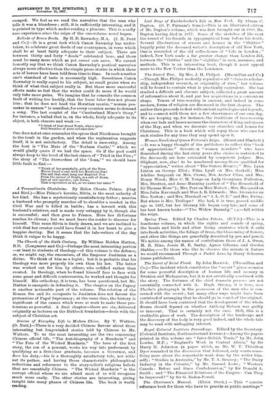Ballads of Brave Deeds. By H. D. Rawnsley, M.A. (J.
M. Dent and Co.)—It is a great task which Canon Rawnsley has under- taken, to celebrate great deeds of our countrymen, in verse which shall be at least fairly adequate to their subject. There are between thirty and forty " deeds " celebrated here, and there must be many more which as yet carent vats saero. We cannot honestly say that we think Canon Rawusley's poetical narrative always more effective than the simple prose stories in which these acts of heroes have been told from time to time. In such a matter one's standard of taste is necessarily high. Sometimes Canon Rawnsley is really equal to his subject, no small praise when we think of what that subject really is. But these more successful efforts make us feel that the writer could do more if he would only take more pains. We imagine that he commits the common fault of writing too hastily, that the limae labor does not please him ; that he does not heed the Horatian maxim," nonum pre- matur in annum" is manifest, for every occasion seems to demand a song. The last couplet of the "Cumberland Miner's Story," for instance, a ballad that is, on the whole, fairly adequate to its object, is both obscure and weak :- " I think of that dread Tomb, whose spice- Still breathes of pure self-sacrifice."
One does not at once remember the spices that Nicodemus brought to the tomb in the garden, and when the explanation suggests itself, it is not satisfactory. The detail is unworthy. Among the best is " The Mate of the Norham Castle,' " which wo would gladly quote if we had the space. Or if the poet could always keep to the level of the last stanza of " Tried in the Fire ;" the story of "The Stewardess of the 'Iona,"' we should have little fault to find :—
" Think of her gratefully, girls of the Tyne Whose blood is salt with the Northern Sea The salt that shall keep our England free From the savour of Death, is a salt of flame, Salt of self-sacrifice, salt divine, That is sprinkled on all, as we name her name "






















































 Previous page
Previous page